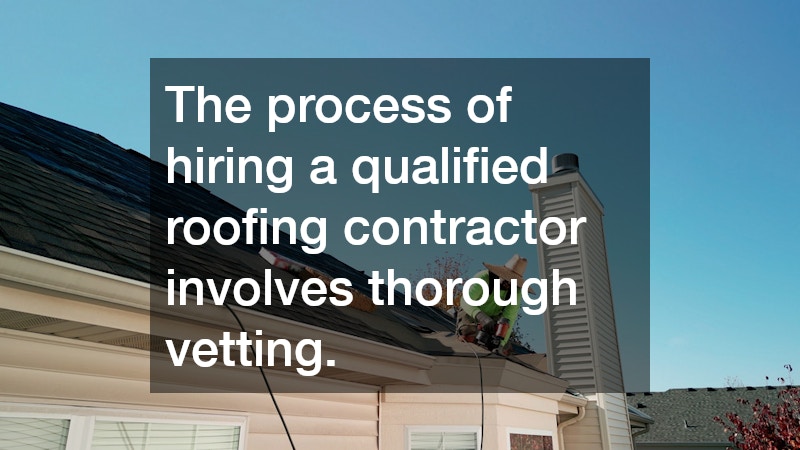

Hiring a roofing contractor can be a daunting task, but understanding the importance of qualifications can simplify the process. Qualified roofing contractors are trained experts, equipped to handle various roofing materials and designs. They ensure quality workmanship, reducing the likelihood of additional costs associated with mistakes or subpar materials.
Moreover, they hold the appropriate licenses and insurance, protecting you from potential legal complications. Given these reasons, a contractor’s qualifications should be your first consideration when embarking on a roofing project.
Homeowners often wonder about the risks of hiring unqualified roofing contractors. These contractors, lacking the necessary skills and certifications, may deliver unsatisfactory work. Problems such as leaks, poor insulation, and structural damage can occur, leading to more significant expenses in the future. Furthermore, without insurance, homeowners may find themselves financially responsible for any accidents or damages during the project. Evaluating the contractor’s qualifications ensures peace of mind and a durable, safe roof for your home.
The process of hiring a qualified roofing contractor involves thorough vetting. Start by asking for references and inspecting past projects similar to yours. Also, verify their licenses and insurance to ensure legal compliance. This step confirms their reliability and competence, making it easier to trust them with your roofing project. Investing time in choosing the right professional helps protect your investment and guarantees quality outcomes.
Identifying Red Flags in the Selection Process
While finding a roofing contractor, it’s crucial to be aware of potential red flags. Common warning signs include unusually low bids, lack of references, and high-pressure sales tactics. These could indicate inexperience or an intention to cut corners, which could lead to inferior results. Moreover, if a contractor hesitates to provide a written contract, it’s a strong indicator of unreliable business practices. A trustworthy contractor will always prioritize transparency and client security by offering detailed project plans and contracts.
Always be cautious of contractors who request full payment upfront. It’s standard practice to pay an initial deposit, but premature full payment may leave you vulnerable to unfinished work or sudden disappearance. A roofer demanding payment before any work has begun should raise immediate concerns. In contrast, a reputable roofing contractor will propose a structured payment schedule. This ensures that both parties are held accountable and the project proceeds smoothly, fostering trust and communication.
Verifying identities and associations is another technique to spot potential problems. Check if your prospective contractor is involved with recognized industry organizations. Affiliation with these groups often suggests adherence to professional standards and codes of conduct. Additionally, a contractor with verifiable ties to local businesses and training programs is likely more reliable. These details provide further assurance, ensuring the roofer you choose is committed to delivering quality work.
Evaluating Contractor Reviews and References
Online reviews and personal references are invaluable tools in assessing a roofing contractor’s reputation. Start by examining review platforms such as Yelp, Google, and Better Business Bureau for feedback on different contractors. Portfolios and testimonials can reveal recurring themes in customer satisfaction, possibly highlighting strengths or potential weaknesses. However, it’s essential to read comments critically, distinguishing genuine feedback from potential bias or anomalies. Consistent positive feedback often signifies a dependable and respected contractor within the community.
Don’t underestimate the power of word-of-mouth recommendations when hiring a roofing contractor. Asking friends and family who have recently undertaken roofing projects can provide honest insights based on firsthand experience. These recommendations often offer candid opinions on work quality and professionalism that may not be evident in online reviews. Moreover, direct suggestions can save time, funneling you towards reliable candidates more efficiently. Developing your shortlist based on trusted sources increases the chances of finding a contractor who meets your expectations.
Once you have a list of potential contractors, request detailed references from each. Speaking directly with past clients can provide a more nuanced view of the contractor’s work ethic and problem-solving abilities. Inquire about the contractor’s timeliness, ability to stay within budget, and how they handled unforeseen issues. This conversation can clarify your contractor’s strengths and limitations, guiding your final selection. Using this holistic approach ensures you hire a roofing contractor grounded in trust and excellence.
Understanding the Importance of a Written Contract
A written contract is a vital component of any roofing project, clearly outlining expectations and responsibilities. This document typically includes start and completion dates, payment schedules, materials, and labor costs. It provides a legally binding framework that protects both the homeowner and the contractor, ensuring mutual accountability. Without it, disagreements over project details can become contentious, consuming time and resources. Thus, a comprehensive written contract mitigates potential conflicts and sets the stage for transparent and smooth project execution.
In addition to defining project parameters, the contract should address contingency plans for unforeseen events. Construction can be unpredictable, with weather delays or supply shortages potentially impacting timelines. Clearly articulated contingency clauses provide solutions in advance, minimizing disruptions. Furthermore, they underscore the contractor’s preparedness and commitment to maintaining project momentum. A contractor advocating for such precise contracts is likely deeply invested in delivering successful project outcomes.
Ultimately, the clarity now only protects parties involved but also fosters trust. Homeowners assured of contractual obligations are more confident in the contractor’s ability to deliver quality work. This confidence is reciprocated, as contractors can depend on homeowners to meet agreed terms. Thus, a contract provides stability and clarity, enhancing communication and collaboration. By emphasizing the importance of a written contract, you safeguard your investment and ensure your roofing project meets all expectations.



